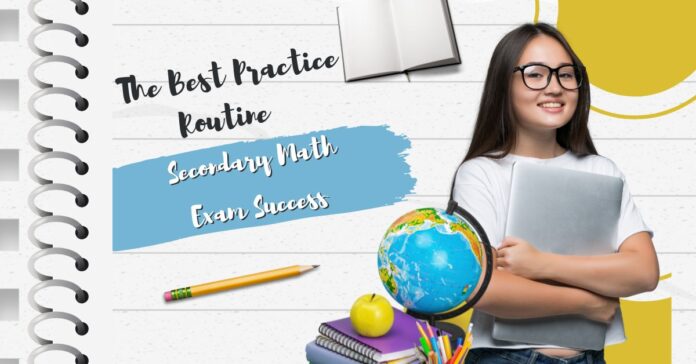Success in secondary math exams doesn’t just happen overnight. It requires discipline, smart strategies, and consistent effort. Whether you’re aiming to improve your current grade or striving for that coveted A1, a structured routine is key. Many students have seen significant improvement with guidance from the best secondary math tuition in Singapore, as it provides targeted support and structured learning plans that align with school syllabuses.
Let’s explore the best practice routine that can lead to secondary math exam success, especially for students looking to build strong foundations and boost their confidence.
1. Set Specific Goals
Having clear goals can significantly improve your study efficiency. Instead of vague goals like “do well in math,” aim for objectives such as “complete 5 practice papers this month” or “master algebra word problems by next week.” These goals should be measurable and time-bound.
-
Break long-term goals into weekly and daily tasks
-
Keep a study journal to track progress
-
Celebrate small wins to stay motivated
When goals are well-defined, they become easier to achieve and help keep you focused throughout the revision period.
2. Build a Consistent Study Schedule
Consistency beats cramming every time. Create a realistic timetable that balances math with other subjects. Allocate at least three focused sessions a week dedicated solely to math revision or problem-solving practice.
-
Study in blocks of 40 to 50 minutes
-
Use the Pomodoro technique to stay focused
-
Review weaker topics regularly
Make sure the schedule includes time for revision, practice papers, and concept reviews. Consistency reinforces memory and improves problem-solving speed.
3. Understand Concepts, Don’t Memorize
Math is not about memorizing formulas but understanding how and why they work. When you grasp the underlying concepts, you can solve problems even when they’re presented in unfamiliar ways.
-
Use visual aids like graphs, number lines, or diagrams
-
Watch explainer videos for difficult topics
-
Discuss tricky questions with a tutor or study group
This habit not only improves exam performance but also builds confidence when faced with challenging questions.
4. Practice with a Purpose
Simply solving random questions won’t help much. Practice should be deliberate and based on the areas you struggle with the most. Focused practice leads to quicker improvement and more efficient learning.
-
Categorize questions by topic and difficulty
-
Tackle challenging questions from past year papers
-
Time yourself to build speed and accuracy
Analyzing mistakes is also essential. Don’t just mark your answers; understand where you went wrong and why.
5. Use Quality Resources
Not all study materials are made equal. Using high-quality resources can make a big difference. This includes assessment books, online learning platforms, and curated question banks from tutors.
-
Choose resources aligned with your school syllabus
-
Avoid skipping difficult sections
-
Ask for book recommendations from teachers or tutors
Students who attend the best secondary math tuition in Singapore often have access to top-tier materials and custom notes that make learning more effective.
6. Engage in Active Revision
Passive revision such as rereading notes or watching videos is not enough. Engage with the content actively by solving problems, teaching concepts to someone else, or writing your own questions.
-
Create mind maps or flashcards
-
Practice daily mental math to sharpen calculations
-
Try explaining formulas aloud to test understanding
Active revision improves recall and deepens understanding, especially useful in high-pressure exam settings.
7. Simulate Exam Conditions
One of the best ways to prepare is to practice under real exam conditions. Set a timer, avoid interruptions, and complete a full paper without breaks. This helps manage anxiety and improves your pacing.
-
Start with open-book timed sessions, then progress to closed-book
-
Review completed papers with a marking scheme
-
Focus on accuracy before attempting speed
Simulated exams provide a benchmark and prepare you for the actual experience.
8. Seek Expert Guidance
Sometimes, self-study isn’t enough. If you’re stuck on certain concepts or feel overwhelmed, it’s helpful to seek guidance. Having a dedicated math tutor can personalize your learning and keep you accountable.
-
Tutors can identify weak spots you may not notice
-
You receive instant feedback and correction
-
It saves time by focusing on what really matters
Learning under the right mentorship, such as what is provided by the best secondary math tuition in Singapore, can significantly elevate your performance.
Conclusion
Achieving secondary math exam success isn’t about last-minute cramming or relying on luck. It’s about following a structured routine, setting clear goals, using quality resources, and practicing smart. Every step you take consistently builds a stronger mathematical foundation and better exam technique. For students who want to accelerate their progress and maximize their potential, having support from the best secondary math tuition in Singapore can be the difference between good and great. Start today, and make every practice session count.

